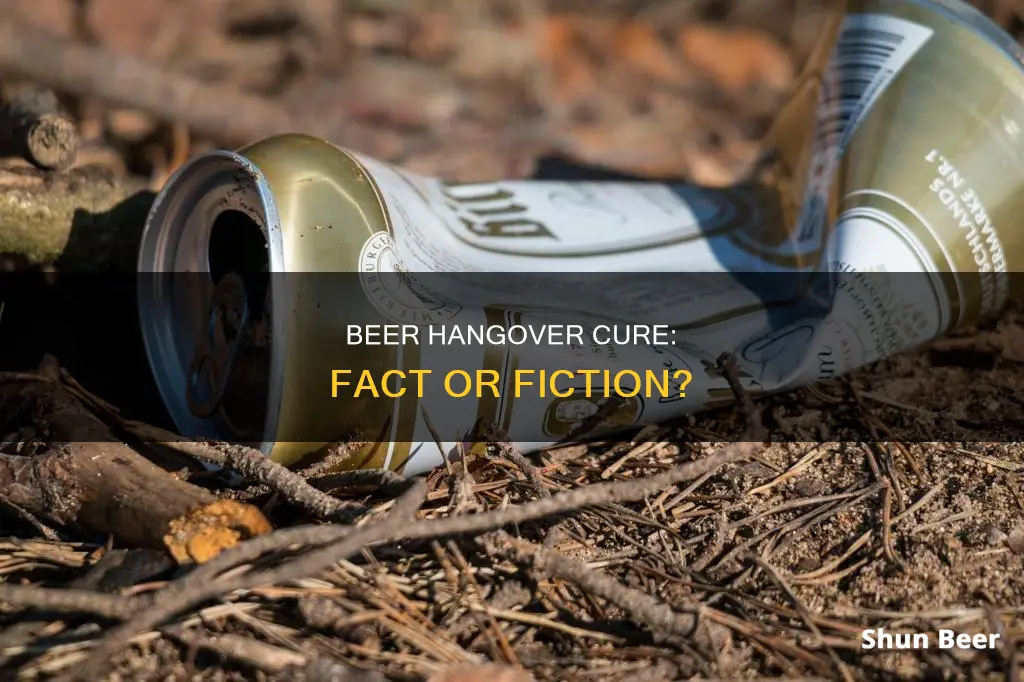
Drinking alcohol to cure a hangover is known as hair of the dog or hair of the dog that bit you. While this method may provide temporary relief by raising endorphin levels and slowing the production of hangover-inducing compounds, it can also worsen your hangover and increase your risk of alcohol abuse. The only guaranteed way to avoid a hangover is to not drink or to drink in moderation.
| Characteristics | Values |
|---|---|
| Effectiveness of drinking beer to cure a hangover | Drinking more alcohol may temporarily relieve hangover symptoms by boosting endorphins and slowing the creation of toxic compounds. However, it will not prevent a hangover and may worsen it. |
| Recommended alternatives | Drinking fluids (especially water), getting carbohydrates into your system, taking a non-acetaminophen pain reliever, drinking coffee or tea, taking B vitamins and zinc, and getting enough sleep. |
What You'll Learn

Drinking more alcohol delays the hangover but doesn't prevent it
Drinking more alcohol to cure a hangover is a well-known method, sometimes called "hair of the dog" or "hair of the dog that bit you". While this approach may provide temporary relief from hangover symptoms, it does not prevent a hangover from occurring. Instead, it merely delays the inevitable, and the hangover will return once you stop drinking.
The theory behind this approach is that by raising your blood alcohol level, you can postpone the onset of hangover symptoms, which tend to be worst when blood alcohol levels return to zero. However, this is only a temporary solution, as the hangover will return once you stop drinking and your blood alcohol level drops again.
Additionally, drinking more alcohol to cure a hangover can lead to an even worse hangover when you eventually stop, as it can increase the severity of symptoms such as headache, dehydration, upset stomach, and fatigue. It can also normalise unhealthy drinking patterns and increase the risk of alcohol abuse and dependency.
Instead of reaching for another drink, there are several other methods that can help alleviate hangover symptoms. These include:
- Drinking fluids, especially water, to combat dehydration caused by alcohol's diuretic effect.
- Consuming carbohydrates to raise blood sugar levels, which can drop after drinking and contribute to fatigue and headaches.
- Avoiding darker-coloured alcoholic beverages, as they contain higher levels of congeners, chemically related compounds that can contribute to more severe hangovers.
- Taking non-steroidal anti-inflammatory drugs (NSAIDs) such as aspirin or ibuprofen to alleviate headaches and overall achy feelings. However, it is important to avoid acetaminophen (Tylenol), as it can cause liver damage when combined with alcohol.
- Drinking coffee or tea for a stimulating effect, although caffeine should be consumed in moderation as it can also cause dehydration.
- Taking B vitamins and zinc, which have been linked to less severe hangovers in some studies.
While drinking more alcohol may provide temporary relief from hangover symptoms, it is important to recognise that it does not address the underlying causes of a hangover and will not prevent it from returning. The most effective way to avoid a hangover is to drink in moderation or abstain from alcohol altogether.
Beer and Flu Medication: A Safe Mix?
You may want to see also

Hangovers are caused by dehydration, so drinking water helps
Drinking water is a must to cure a hangover. Alcohol is a diuretic and can cause dehydration, so drinking water helps to replace lost fluids. Before going to bed after drinking, it is recommended to drink 16 to 20 ounces of water. Additionally, drinking a glass of water with every alcoholic beverage and alternating between the two can help to rehydrate and replace lost fluids.
Dehydration is a common side effect of drinking alcohol, and it can lead to symptoms such as thirst, fatigue, and headache. By drinking water, you can help alleviate these symptoms and speed up your recovery from a hangover.
It is important to note that while drinking water is crucial, it is not the only factor in curing a hangover. Hangovers are caused by a combination of factors, including mild dehydration, disrupted sleep, gastrointestinal irritation, inflammation, and acetaldehyde exposure. Therefore, it is essential to address these factors as well for a complete recovery.
While drinking water is essential, it is also crucial to be cautious about drinking too much water. Although rare, it is possible to drink too much water, which can lead to water intoxication and potentially dangerous health consequences. Therefore, it is important to drink water in moderation and listen to your body's needs.
Beer Enemas: Do They Work or Are They Dangerous?
You may want to see also

Eating carbs helps to bring blood sugar levels back up
While drinking a beer in the morning may provide temporary relief from a hangover, it will not prevent it entirely. The "hair of the dog" approach to curing a hangover involves drinking more alcohol to reduce symptoms. However, this method can lead to an even worse hangover when the alcohol wears off.
Eating carbohydrates, on the other hand, can be an effective way to help bring blood sugar levels back up after a night of drinking. Drinking alcohol can lower blood sugar levels, leading to fatigue and headaches. Eating carbs can help nudge blood sugar levels back to normal.
When you drink, your liver is busy metabolizing the alcohol, and it may not be able to keep up with producing enough glucose from stored carbs, causing your blood sugar levels to dip. This can leave you feeling irritable and tired. Eating some carbohydrates can help provide your body with the fuel it needs to recover from a night of drinking.
In addition to eating carbs, there are a few other things you can do to help ease a hangover:
- Drink fluids: Alcohol is a diuretic and can cause dehydration, so it's important to drink plenty of water to replace lost fluids.
- Get some sleep: Alcohol can disrupt sleep, so getting a good night's rest can help reduce the fatigue associated with a hangover.
- Take an NSAID pain reliever: Hangover symptoms are often due to inflammation, so anti-inflammatory pain relievers can help ease the discomfort.
- Drink coffee or tea: Caffeine can help with the grogginess, but be cautious as it can also irritate the stomach, which is already inflamed from alcohol consumption.
Remember, the only sure way to avoid a hangover is to drink in moderation or abstain from alcohol altogether.
Drinking Beer on San Diego Beaches: What's Allowed?
You may want to see also

Pain relievers can help, but avoid acetaminophen
While pain relievers can help with a hangover, it is important to avoid acetaminophen (also known as Tylenol). This is because acetaminophen is metabolized in the liver, just like alcohol. Therefore, consuming alcohol and acetaminophen together can increase the risk of liver damage. In addition, acetaminophen can increase the risk of kidney disease.
Other over-the-counter pain relievers, such as aspirin (Advil) and ibuprofen (Motrin), can be used to reduce headaches and muscle pain associated with a hangover. However, these should be avoided if you are experiencing nausea or stomach pain, as they can irritate the stomach lining and increase acid production. It is also important to note that ibuprofen can cause gastrointestinal issues, such as ulcers, stomach perforations, and gastrointestinal bleeding, especially when used chronically or in combination with alcohol.
It is always advisable to consult a doctor or healthcare provider before taking any medication, especially if you have existing gastrointestinal issues. While pain relievers can help manage some hangover symptoms, it is important to remember that they do not cure a hangover, and the only way to truly prevent a hangover is to avoid drinking or to drink in moderation.
Drinking Alcohol-Free Beer at Work: Is It Okay?
You may want to see also

Coffee can help, but irritates the stomach lining
Coffee can help with a hangover, but it's important to be cautious. While caffeine can help you feel more alert, it can also irritate the stomach lining, which is already inflamed from drinking alcohol. This means that if you're feeling nauseous, coffee may make matters worse.
If you're a regular coffee drinker, skipping your morning cup could lead to caffeine withdrawal on top of your hangover. In this case, drinking a small amount of coffee may help. Dr. John Brick recommends starting with a quarter of a cup of coffee and waiting 20 minutes to see if you feel better before deciding whether to drink more. It's also important to drink water, as studies suggest caffeine causes dehydration.
While coffee may provide some relief, it won't cure a hangover. The only way to completely avoid a hangover is to not drink alcohol or to keep alcohol intake to a minimum.
Beer and Medication: Safe or Not?
You may want to see also
Frequently asked questions
No, drinking more alcohol will only prolong the hangover and make it worse. This is known as the "hair of the dog" method, which is not recommended. The only guaranteed way to avoid a hangover is to not drink or to drink in moderation.
Drinking a beer can temporarily boost endorphins and slow the production of hangover-inducing compounds, which can make you feel better. However, once you stop drinking, the hangover will return.
There is no specific amount of beer that can help a hangover. Drinking any amount of beer will only delay the hangover and may increase the risk of alcoholism.







